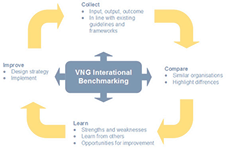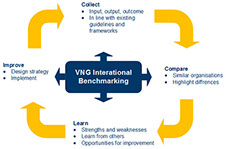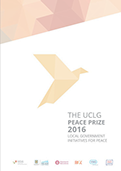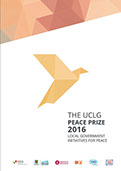‘Alternative conflict resolution is an effective and efficient system to avoid escalation and to reach agreements. It also helps to reduce overburdening the tribunals. We are pleased that the capacity building and training activities of VNG International have contributed to the strengthening of this system in Guatemala’.
From: a letter from the Dutch Ministry of Foreign Affairs to the Director of ‘Metodos Alternativos de Solucion de Conflictos, Organismo Judicial’.
‘The way it goes now, we are revolutionising the approaches in the field of security. We are introducing changes in the habits and practices of governance security. STAREC told me that our approach is going to inspire other projects. They even used the words « alignment to the VNG International approaches », which are characterised by creating ownership for these approaches among the authorities and the communities, institutional anchoring, involving step by step the provincial assemblies, participative situation analyses and security action planning, benchmarking and coaching to address the lacking capacity at the local government levels.’
Thierry Kambere, VNG International Team Leader in East DRC.
Turkey, Serbia and Albania, Leadership Programme for Security and Rule of Law CoPROL (2013-2016)
‘The leadership programme focused on strengthening public leadership to ensure better in implementing and enforcing law and involving civil society. It introduced a new thinking of leadership, vision, strategy and policy development to respond to challenges in the field of public security. The activities were implemented for a mixed group of high level civil servants, senior police officers, public prosecutors and judges. (…) The services provided by VNG International have been carried out in a professional manner with necessary due care and diligence and have been fully completed.’
From: Certificate of Completion, Ministry of Foreign Affairs of The Netherlands.
VNG International Annual Update 2017
7 Fostering Local Security and the Rule of Law
Providing security and protection is the primary responsibility of a government. For local governments this translates into concrete actions, varying with the specific context. More or less universal measures include working street lighting, security-conscious spatial planning, etc. In fragile environments, security threats are often also related to political or ethnic conflicts. In such cases local governments can promote dialogue and cooperation at the local level, thereby increasing security, even when at the national level conflicts escalate and seem to be impossible to resolve. Whatever the context, a crucial common denominator is that security in not only an objective ‘situation’. It is also a subjective ‘perception’. Of great relevance is the way in which local governments
With our projects in Guatemala, the DRC and Burundi, in South-Sudan, and in Albania, Serbia and Turkey, we have achieved tangible success in this area. For each project, context and approach vary, but the common thread is: improvement is built up step-by-step, through a long, careful process, with much attention for local ownership. Important elements are:
- bringing the various stakeholders around the table: local government, police, justice and civil society representatives; building trust and confidence; working on the political will and the will to collaborate;
- identifying and analysing the biggest security threats, and developing a local security plan;
- clarifying each one’s roles and responsibilities, and capacitating the stakeholders to fulfil those;
- training leadership skills, awareness raising about human rights, norms and values;
- strengthening of the preconditions for the functioning of the local security institutions, by improving the organisation and sometimes also with small investments (in communication means; office materials; basic infrastructure, etc.);
- enabling horizontal learning through peer-to-peer exchanges and through benchmarking – an organised process of learning on the basis of comparing performance indicators of similar organisations.
In Guatemala, the project ‘From Fragile to Stabile’ (2015-2016), aimed at increasing access to the justice system, but also at reducing the pressure on the formal justice system by strengthening other forms of conflict settlement, and at participation of the rural inhabitants in municipal governance and institutional strengthening of municipalities in relation to justice and settlement. The results include an increased number of conciliators, stronger and more self-conscious municipal victim organisations and better involvement of these organisations in monitoring the security situation in their municipality. At the same time, municipal institutional capacity has increased on the topics of community justice, settlement and security. With stronger actors on both sides, also the interaction between municipalities and victim organisations has improved, which is of great relevance beyond the issue of justice alone.
In 2016 we concluded a 4-year project ‘Restoring the Contract’ with Cordaid and CILC in Burundi and South-Kivu, DRC, which clearly contributed to improved functioning of the Local Security Committees in most of the pilot municipalities in both countries. The Security Committees are based on the shared responsibilities of the local administration, police, justice and civil society for local security. The project design was built on a combination of capacity-building by VNG International and Performance Based Financing, managed by Cordaid and its local partners. These two intervention types reinforced each other. VNG International also facilitated horizontal learning between the participating local security institutions in the participating pilot municipalities. This was new for all the participants involved and became a real eye-opener. It encouraged critical self-assessment and curiosity to understand why peers perform better. Participants in the closing conferences in both countries gave impressive testimonies of the regained trust and collaboration between civil society organisations and the local security institutions. This led to renewed dialogue on security threats and necessary measures, forms of cooperation, and a new sense of partnership.
Together with IOM, Cordaid and Pax, we started a more or less comparable 4-year project at the end of 2015 in the provinces North-Kivu and Ituri in DRC. In this project “Consortium for the Integrated Stabilization and Peace of Eastern DRC (CISPE) (2015-2018) too, we can already observe change, in the sense that the various stakeholders are beginning to see the advantages of collaboration, and that local governments, supported through training and coaching, are fulfilling more clearly the responsibilities they have for promoting local security.
Again in South Kivu, DRC, we will extend the approach to local security institutions and civil society in the territory of Kalehe, in a new project with ZOA and War Child: ‘INAWEZEKANA’ (2017-2019).
In our project ‘Interlinking Peace Building, Decentralisation and Development’ in South Sudan (2013-2017), we got closely involved in the process towards the ‘Marial Bai Agreement’, which regulates the relationship between pastoralists and farmers. Seasonal migration of pastoralists from Tonj and Gogrial to Wau State during the dry season was known for the violent conflicts it created with farmers along the migration route. Crops were destroyed, cattle were raided or killed, and -sometimes mortal- violence between farmers and pastoralists and their respective communities was not unusual. VNG International was praised for its brokering role in the process of reaching an agreement to prevent further conflicts. We supported the process of building trust and the will to collaborate, and drafting agreements on a range of mutual responsibilities, including improved communication, compensation in the case of damage, and the role of the state and county government in overseeing and supporting the implementation of the agreement. The latter was elaborated in the ‘Interstate Policy to Support the Implementation of Signed Peace Agreements’. This is the first time in South Sudan that a tri-state policy was developed to regulate cattle migration with a joint responsibility for government and communities. While community peace agreements are common in South Sudan, implementation of such agreements often fails, because plans, organisation, procedures and communication lack. VNG International worked with communities, community committees, local and state government departments and agents to focus on implementation, management and control. This was done in such a way that we carefully left the ownership with the respective stakeholders.
The context for the Leadership Programme for Security and Rule of Law CoPROL, in Albania, Serbia and Turkey (2013-2016), was different from the other projects because of the perspective of EU accession. The project supported government reforms in the three countries, in the field of local public security and further integration of reform processes to align with European standards, thereby tackling political and administrative patterns of behaviour to provide EU integration frameworks for policy development. Through capacity building activities, values as efficiency, transparency, accountability, integrity, participation and cooperation in the field of local public security were addressed. The programme set European standards of performance and provided EU integration frameworks for policy development. The project was designed to promote the interaction between different stakeholders to ensure institutions perform better in implementing and enforcing the law and in involving civil society.
The concrete results are manifold:
- high-level managers at national and local institutions in the public security sector better equipped to develop a vision, strategy and policy and to apply modern ideas of leadership;
- the implementation of 12 back home actions plans;
- the introduction of citizens’ perception survey on local safety and security (conducted among more than 3900 citizens in 18 pilot local governments in the three countries);
- 18 local government action plans for future improvements in the field of complaints procedures;
- increased willingness to report crimes and visibility for taking safety measures;
- implementation of the Local Safety and Security Monitor (based on the Dutch Safety Monitor) and standardisation in Serbian policy;
- the development and dissemination of time a handbook on the Serbian Local Safety and Security Monitor, disseminated at central and local levels of government;
- training of trainers completed and training guidelines developed with and by the participants, on leadership, integrity and other related subjects;
- various benchmark cycles completed, with numerous horizontal learning results;
- and more ….
Policy development and exchange of experience
VNG International was one of the initiators and later on provided the secretariat for the UCLG Peace Prize 2016. Together with UCLG, the city of Bogotá, the province of Barcelona, Pax and vfonds, we started a process of collecting and sharing inspiring local government initiatives for peace. 46 applications for the Peace Prize were received from all over the world. They reflect the multiple ways in which local governments contribute to establishing dialogue where there is conflict, creating understanding where there is fear or hate, and how they show leadership, commitment and initiative. A booklet is available here presenting a selection of the cases, the process of bringing them together, the history of the Peace Prize, etc.
VNG International is also an active member of the Knowledge Platform Security & Rule of Law, which aims to jointly explore innovative approaches to emerging challenges in the field of security and rule of law in fragile and conflict affected contexts. One element in our contribution focuses on the need to support the steering away of local (conflict) dynamics from national or even international conflicts. This is where local leaders can make a difference: giving more weight to their local responsibilities than to loyalty to -and pressure from- ‘higher’ party or authority levels.






